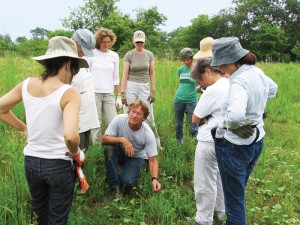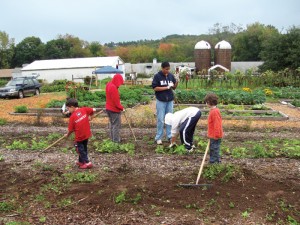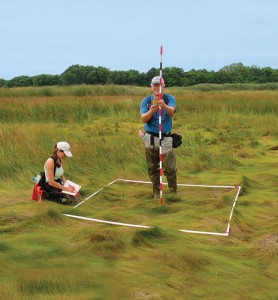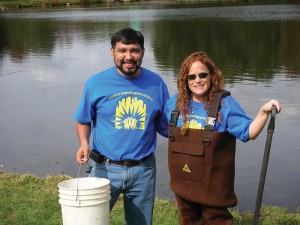
Friends and family consider Becky Martorelli ’79 (CLAS) a fount of knowledge when it comes to the care and feeding of their gardens.
Inspired to understand plants and their environment as a creative outlet, Martorelli completed the 16-week Master Gardener program offered through the Connecticut Cooperative Extension System (CES), an educational and community outreach network operated by UConn’s College of Agriculture and Natural Resources. Today the former computer technician is a First Level Certified Advanced Master Gardener who develops landscape designs for her husband’s contracting business and fields questions about flowers, trees, insects, and lawns wherever she goes.
“After the program, everything looks different; it’s a whole new perspective,” she says. “Knowledge is power. I try to pass that on to other people.”
Developing knowledgeable gardeners is just one facet of the CES, which serves as an important underpinning for a wide range of programs reaching thousands of Connecticut residents each year, from inspiring 4-H students to educating people about proper nutrition.
The Master Gardener program trains Connecticut citizens in sustainable gardening and horticulture with the specific goal of sharing their knowledge with the public. The program meets weekly from January through April, with classes on water quality, botany, entomology, soils, turf, pesticides, vegetables, and plant diagnostics and integrated pest management, among others. In 2008, Master Gardeners made more than 10,000 contacts with the public and volunteered more than 10,600 hours of community service in nearly 200 outreach projects.
But the CES offers many other programs beyond providing tips on better gardening – including land use education, food and nutrition, leadership development, and youth development.
“Many citizens utilize those services through our programs and probably never step on the Storrs campus,” says Gregory J. Weidemann, dean of the College of Agriculture and Natural Resources and director of the CES. “The Cooperative Extension System plays a vital role in fulfilling the University’s community outreach mission.”
For instance, two CES programs provide nutrition education. The Expanded Food and Nutrition Education Program (EFNEP) helps low-income families, children, and individuals throughout Connecticut recognize their attitudes on food, reflect on why they eat what they eat, and ultimately make better food choices. Funded by the U.S. Department of Agriculture, EFNEP has assisted more than 40,000 Connecticut families since its inception.
“Our staff will go to a homeless shelter, an after-school program, or a community center,” says nutritionist Linda Drake, director of EFNEP. “They don’t come to our office; we go where they are.”
Meanwhile, a CES program called the Supplemental Nutrition Assistance Program (SNAP-Ed) offers nutrition education to food stamp-eligible families. Last year, SNAP-Ed provided nutrition education information to more than 438,000 people through workshops, small group sessions, and pamphlets, newsletters, and public service announcements. SNAP-Ed is run in partnership with the Connecticut Department of Public Health, the Department of Social Services, and several community agencies.
Youth Development

Most people recognize the green 4-H clover, but not everyone knows that Connecticut 4-H is delivered through UConn’s CES. It is the largest youth-serving organization in the country, reaching more than 30,000 Connecticut youths annually, with 4,000 attending one of four 4-H camps in 2009. In addition to activities centered on farming and animal science, programs include public speaking, expressive arts, marine science, environmental education, citizenship, and photography.
A third-generation 4-H participant, program associate for volunteer management and development Bonnie Burr ’83 (CANR) says the bottom line is introducing science to young people in engaging ways. “It’s the soft-sell of getting kids engaged with science – that’s really what we’re all about,” she says.
The CES and 4-H programming recently receive added support with a planned gift of $250,000 from Nancy H. Bull, UConn vice provost for academic administration, and her husband, David, a retired U.S. Air Force colonel who is dean of administration at Quinebaug Valley Community College. A former associate director of CES, Nancy Bull has worked with the CES for more than 30 years, while David was involved in 4-H throughout his childhood.
Lessons in Land Use

The CES at UConn is also home to the Center for Land Use Education and Research (CLEAR), which comprises several programs focused on improving local land use planning, including the Land Use Academy, which provides “basic training” for municipal commissioners statewide on such topics as map reading and legal responsibilities involved in land use decisions. To date, the Academy has educated commissioners from 130 of Connecticut’s 169 towns.
CLEAR maintains a website of sophisticated modeling tools, including the newly launched Connecticut Environmental Conditions Online, or CT ECO.
A senior planner for the Windham Region Council of Governments and Columbia’s town planner, Jana Butts stresses its value to land use commissions, developers, engineers, and the general public.
“I’m hoping land use boards will start using this website to help them make decisions and help them understand how conservation and development can fit together without damaging the landscape or community,” says Butts.
“We make the information accessible, understandable, and available to communities and land use decision makers,” says Chet Arnold, associate director of CLEAR. Overall, CLEAR holds more than 150 workshops per year for municipal officials.
The Joy of Extension
Roger Adams, head of the Department of Extension and interim associate director of the Cooperative Extension System, is excited by the ways in which new research in the areas of agriculture, food and nutrition, and public health is shared through the CES.

“We take that research and mold it into ways the average person … will understand and implement in their daily lives. That’s the joy of extension,” says Adams. “It’s seeing the positive change that happens and the difference it makes in people’s lives.”
For Master Gardener Martorelli, her newfound knowledge about better gardening techniques was quickly integrated into her own life as well as the lives of those around her.
“I couldn’t wait to share what I had learned with everyone else – my family first of all,” she says. “I pointed out all of the invasive [plants in their gardens]; things that I thought used to be pretty all of a sudden looked like the enemy to me because I was viewing them differently. I was identifying plants through their botanical names. I really started getting more conscientious about water usage, what I was using in my garden.”
And she has started home composting, going so far as to purchase a counter composter for the winter. “I’d like to start a worm farm next summer!”
Giving individuals like Martorelli the opportunity to expand their knowledge, the CES at UConn continues to make a collective impact on the state’s citizens through agricultural training, nutrition education, and the many other development programs targeting children, families, and professionals. More information on the Connecticut Cooperative Extension System is available on the CES website.


